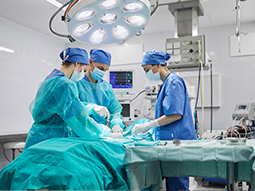One of the risks associated with hernia repair surgery is that the hernia can return. If the hernia repair fails and the hernia reappears, this is referred to as a recurrent hernia.
Symptoms of recurrent hernia
A recurrent hernia is recognized as a bulge, sometimes painful, that appears at or near the site of the original hernia. If the hernia progresses and the intestines protrude into the hernia, this can cause severe health complications, such as:
- Infection
- Constipation
- Nausea/vomiting
- Loss of blood supply to the intestines
Causes of recurrent hernia
A hernia can reappear for a variety of reasons, some of which may not always be clear. The following circumstances can place patients at an increased risk of a recurrent hernia:
- Infection of wound from initial hernia surgery
- Being too active too soon after surgery
- Chronic use of steroids
- Chronic acute cough
- Smoking
- Obesity
What to expect at your appointment
During your appointment, your doctor will perform a physical examination and ask you about your symptoms. In order to fully understand the extent of the recurrence, your doctor may prescribe an imaging test, such as:
- A CT scan
- An MRI scan
- Ultrasound imaging
Treatment
Non-surgical treatments for recurrent hernia
Surgical intervention is necessary in order to repair a recurrent hernia.
Surgical treatment for recurrent hernia and post-treatment
Recurrent hernias can be the most challenging type of hernia to repair.
Laparoscopic recurrent hernia repair
Individuals with a recurrent hernia are good candidates for laparoscopic repair. This is because the muscles of the abdomen are weak and laparoscopic surgical techniques can maintain the integrity of the muscles more so than an open hernia repair procedure. Additionally, scar tissue from a previous surgery can be avoided when using laparoscopic equipment.
Open recurrent hernia repair
If the recurrent hernia is complex, open repair may be necessary in order to properly restore the functionality of the abdominal wall. Open repair allows surgeons to carefully move abdominal tissues to their original position and place mesh on both sides of the weakened muscle in order to provide additional reinforcement.
Depending on the type of surgery performed and the overall health of the individual, patients may be able to go home the same day of the operation. When the individual can return to daily activities can range from one to three weeks after the surgery. It is important to schedule and attend all recommended follow-up appointments.
Our providers

Expert surgery care
Getting the care you need starts with seeing one of our hernia specialists.









